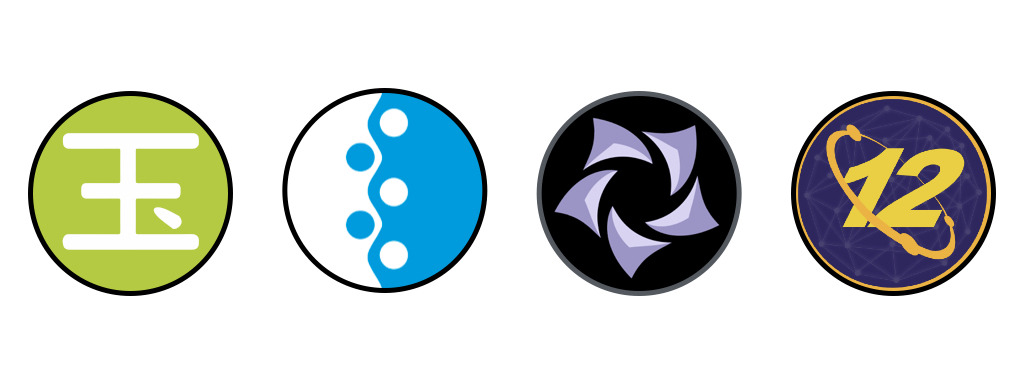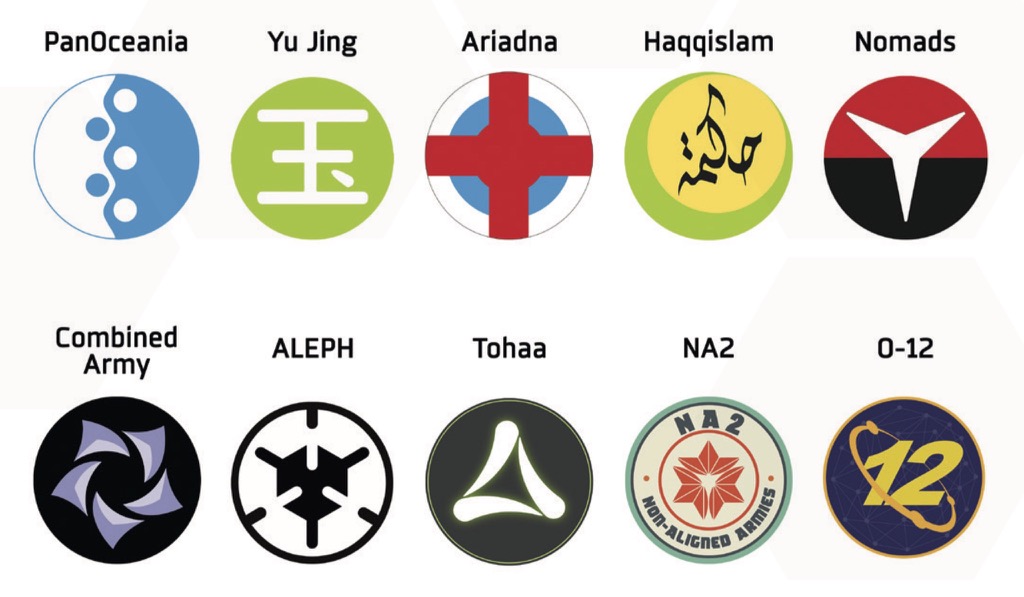Basic Rules
Introduction | Basic Rules | Movement Module | Combat Module | Ammunition and Weaponry | Skills and Equipment Module | Command Module | Fireteams Module | Terrain and Scenery Structures | Triumph and Defeat Module | Setting up the Gaming Table | Scenarios | Game States and Glossary | Quick Reference Charts | Infinity Reinforcements
Game Elements | Open and Private Information | Labels and Traits | Armies | Unit Profile | Game States | Army List | Orders and the Order Pool | Trooper Activation | Initiative and Deployment | Game Sequence | Loss of Lieutenant | Silhouettes | Line of Fire | Zone of Control | Zones, Bases and Silhouettes | Coherency | Distances and Measurements | Replacing Models and Markers | Rolls
The basic rules are one of the pillars of the general game mechanics; these are the rules all players must know in order to play. This chapter creates the game engine that establishes Infinity as an excellent modern tactical combat simulator.
Basic Rules establish the characteristics of Infinity Troopers and the way in which they behave inside the game environment. They also determine how to create combat forces and the rules needed to begin playing, as well as the game structure. The fundamental section of this chapter is the explanation of the Orders system, the central core of the game model that players will be using constantly. It is the system that enables players to participate during the entire game, without having to stop playing at any point.
To play Infinity you will need the following things:
- A measuring tape of at least 48 inches.
- Some 20-sided dice (d20).
- Corvus Belli miniatures to represent the Troopers of both players.
- Scenery. At least 4 big elements and 10 small items. As it will be soon become apparent, scenery and terrain are a very important part of Infinity.
- A 24 x 32 inches gaming table. Although the game can be played on surfaces of other sizes, this is the ideal gaming table size to start playing Infinity CodeOne.
- A 48 x 48-inch gaming table. Although the game can be played on smaller surfaces, this is the ideal gaming table size to player larger games of Infinity N4.
- Markers, Tokens and templates. All of them are included in the Infinity CodeOne Battle Packs and are also all available for free on the Download section of the official Infinity website at www.infinitytheuniverse.com.
Game Modes
| Type of Game | Table Size | Deployment Zone | Army Points | SWC | Game Duration |
|---|---|---|---|---|---|
| Initial Matches | 24 x 32 inches | 8 x 24 inches | 15 | 3 | 40 min |
| Intermediate Matches | 32 x 48 inches | 8 x 32 inches | 25 | 5 | 60 min |
| Standard Matches | 48 x 48 inches | 12 x 48 inches | 30 | 6 | 90 min |
| Type of Game | Table Size | Deployment Zone | Army Points | SWC | Game Duration |
|---|---|---|---|---|---|
| Initial Matches | 24 x 32 inches | 8 x 24 inches | 150 | 3 | 40 min |
| Raid Matches | 32 x 48 inches | 8 x 32 inches | 200 | 4 | 50 min |
| Intermediate Matches | 32 x 48 inches | 8 x 32 inches | 250 | 5 | 60 min |
| Standard Matches | 48 x 48 inches | 12 x 48 inches | 300 | 6 | 90 min |
| Large Matches | 48 x 48 inches | 12 x 48 inches | 400 | 8 | 120 min |
Game Elements: Terminology and Alignment
This rules set uses precise terminology throughout to refer to key elements of the game that players have at their disposal.
You can find all Infinity Terminology and Alignment in the Glossary.
Open and Private Information
Information in an Infinity game can be either Open or Private. [read more...]
Labels and Traits in Infinity
The function of Labels and Traits is to quickly indicate details and to group common features.
Labels
Labels indicate a series of defining aspects of a Skill, Special Skill or piece of Equipment for quick reference. You can find all Infinity Labels in the Glossary.
Traits
Most weapons and Equipment have special features, called Traits. Traits usually relate to Common Skills or Special Skills, or to specific effects that make these items special. Some of them are self-explanatory. You can find all Infinity Traits in the Glossary.
Basic Concepts in Infinity
Armies
In Infinity there are several Factions that represent the different Armies of the Human Sphere and the alien forces of the Combined Army.

The Armies: Yu Jing | PanOceania | Combined Army | O-12

Unit Profile
“Soldiers” in Infinity are called Troopers and are grouped into Units belonging to each Army. [read more...]
Game States
‘State’ is a game term for each of the altered conditions, beneficial or not, that a Trooper or game element might find itself in. Each state has a specific game effect, as well as individual methods of activation and cancellation. States in Infinity are cumulative, and are indicated by placing State Tokens next to an affected Trooper.
Army List
The Army List is the list of troops that make up the combat forces the player will be using during the game. [read more...]
Infinity Army is the free and official tool to create Army Lists for Infinity. This tool offers:
- An easy and intuitive interface. The software of this application assesses the legality of each Army List the player creates, keeping in consideration the guidelines for the creation of Army Lists, both for standard games and for participating in Infinity events.
- Infinity Army has all the updated Unit Profiles available for Infinity.
Infinity Army is the quickest and easiest way to create Army Lists, and it is available for free on the official Infinity website: http://www.infinitytheuniverse.com
Orders and the Order Pool
In Infinity, the capacity of an army to maneuver and take actions is measured in Orders. An Order is a game concept, a sort of currency spent to activate a Trooper so that it can take part in the battle. The higher the number of Orders at its disposal, the more an army can do. [read more...]
Trooper Activation
Players use Orders to activate Troopers and have them perform actions in the form of Skills (Move, Jump, CC Attack…). [read more...]
Initiative and Deployment
Before the game begins, players make a Face to Face Roll using their respective Lieutenants WIP Attributes. [read more...]
Game Sequence
Infinity games are divided into Game Rounds, or Rounds, during which both players have the chance to take an active role. This means each Round is divided into two Player Turns, or Turns, one for each player. [read more...]
Loss of Lieutenant
Despite their training and their constant connection with Mission Control, losing a team leader to enemy fire or system failure can wreak havoc on the discipline of soldiers, creating a moment of confusion in which everyone is left to their own devices, without a coordinated tactical approach. [read more...]
Silhouette Templates, Line of Fire And Zone Of Control
Silhouettes
In game terms, all Troopers occupy an unvarying volume on the table. This volume is cylinder-shaped, with its width determined by the base size and its height by the type of Trooper. [read more...]
Line of Fire (LoF)
In Infinity, Troopers have a Line of Fire (LoF) angle of 180º, that is, they can see with the front half of their base, as shown on the base of the miniatures. [read more...]
Zone of Control (ZoC)
Troopers have an awareness of their surroundings. Zone of Control (ZoC) is defined as an imaginary cylinder with a radius of 8 inches from the outer edge of the Trooper's Silhouette, extending 8 inches up from the top of the Silhouette and 8 inches down from the bottom of the Silhouette. [read more...]
Interaction Between Zones, Bases and Silhouettes
This ruleset frequently uses terms that define the interaction between Troopers and other game elements. [read more...]
Coherency
Coherency is the game mechanic which allows management of several linked troopers acting together and simultaneously in the same Order while applying a rule, Special Skill, piece of Equipment, Game State... that requires those troopers to stay in close proximity. [read more...]
Distances and Measurements
Distances in the game table are measured in inches, using a tape measure or ruler. [read more...]
Replacing Models and Markers
Occasionally, during a game, it is necessary to replace a Game Element like a Trooper, or a piece of Equipment, with another Model or Marker due to a Special Skill, piece of Equipment, game condition, or scenario condition. For simplicity, these definitions always refer to the term Trooper. [read more...]
Rolls
Infinity uses 20-sided dice (commonly known as d20) to determine whether specific actions are successful. For example, players roll dice to find out whether their Troopers succeed in hitting their target in ranged combat, hacking into enemy systems, discovering a hidden enemy, etc. [read more...]
Introduction | Basic Rules | Movement Module | Combat Module | Ammunition and Weaponry | Skills and Equipment Module | Command Module | Fireteams Module | Terrain and Scenery Structures | Triumph and Defeat Module | Setting up the Gaming Table | Scenarios | Game States and Glossary | Quick Reference Charts | Infinity Reinforcements
Game Elements | Open and Private Information | Labels and Traits | Armies | Unit Profile | Game States | Army List | Orders and the Order Pool | Trooper Activation | Initiative and Deployment | Game Sequence | Loss of Lieutenant | Silhouettes | Line of Fire | Zone of Control | Zones, Bases and Silhouettes | Coherency | Distances and Measurements | Replacing Models and Markers | Rolls